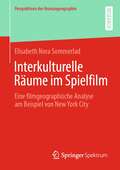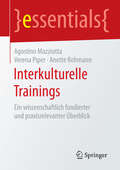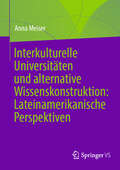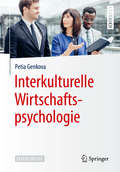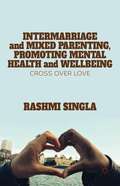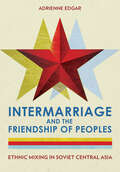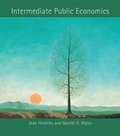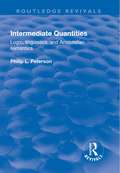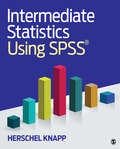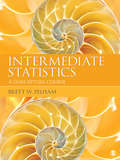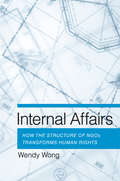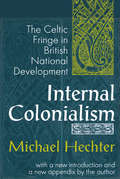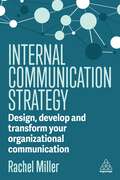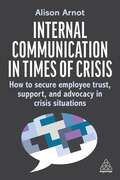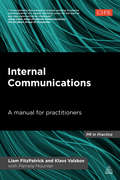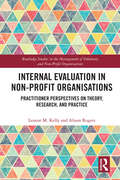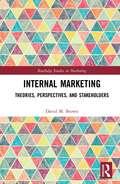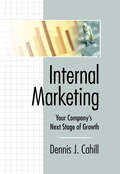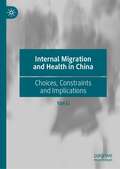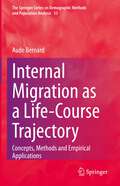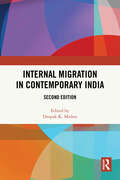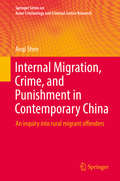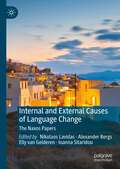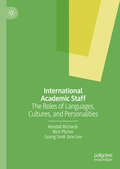- Table View
- List View
Interkulturelle Räume im Spielfilm: Eine filmgeographische Analyse am Beispiel von New York City (Perspektiven der Humangeographie)
by Elisabeth Nora SommerladSpielfilme imaginieren New York City oft als eine Stadt, in der das alltägliche Zusammenleben durch interkulturelle Begegnungen konstituiert wird. Das vorliegende Buch nimmt sich diesem Topos an. Die filmgeographische Studie analysiert, wie Spielfilme interkulturelle Begegnungen inszenieren. Die Autorin erarbeitet anhand von 17 US-amerikanischen Spielfilmen, wie interkulturelle Begegnungen strategisch inszeniert werden. Hierbei hinterfragt sie kritisch die Darstellungen gesellschaftlicher Herausforderungen, welche sich im Kontext des dargebotenen Miteinanders ergeben. Das Ergebnis sind sechs vielschichtige Dimensionen interkultureller Räume. Diese offenbaren, dass NYC letztlich vor allem als Stadt kultureller Koexistenz inszeniert wird – als Projektionsfolie einer Gesellschaft, in der sich Individuen anhand diffuser kultureller Marker beständig voneinander abgrenzen. Die Studie liefert damit einen Beitrag zum mediensensiblen Diskurs über interkulturelle Fragestellungen, denen in globalisierten, kulturell diversen und medienaffinen Gesellschaften höchste Relevanz zukommt.
Interkulturelle Trainings: Ein wissenschaftlich fundierter und praxisrelevanter Überblick (essentials)
by Agostino Mazziotta Verena Piper Anette RohmannDieAutorInnen bieten einen wissenschaftlich fundierten und gleichzeitigpraxisnahen Überblick über interkulturelle Trainings. Herausforderungen imRahmen der Planung und Durchführung werden abgebildet und es wird aufgezeigt,wie deren Wirksamkeit in der Praxis erhöht werden kann. Als Anregung zurkritischen Auseinandersetzung mit den Inhalten sind gezielte Fragen zurReflexion sowie eine Checkliste für die Bewertung von bereits entwickeltenTrainingsmaßnahmen enthalten. Zusätzlich schildern die AutorInnen Beispieletheoretisch fundierter Trainings und geben Hinweise für eine gelungene Konzeptioneigener Maßnahmen.
Interkulturelle Universitäten und alternative Wissenskonstruktion: Lateinamerikanische Perspektiven
by Anna MeiserDie seit rund zwanzig Jahren in ganz Lateinamerika gegründeten „Interkulturellen Universitäten“ erheben gegenüber den Hochschulen euroamerikanischer Tradition den Anspruch einer „alternativen“ Forschung und Lehre. Die Arbeit analysiert, wie solche Universitäten lokale und indigene Wissenstraditionen in Dialog mit „westlichen“ Wissenschaftsdiskursen zu bringen und damit Wissen interkulturell zu konstruieren suchen. Sie zeigt dabei Wege zu einer Dekolonialisierung von Wissenschaft und Hochschulbildung auf, reflektiert die ethnologische Fachtradition und deren methodisches Arbeiten und diskutiert das allgemeine Potential einer Interkulturalisierung von Wissenschaft. Grundlage dieser Analyse sind umfassende Feldforschungen vor allem in Ecuador und Mexiko.
Interkulturelle Wirtschaftspsychologie (Springer-Lehrbuch)
by Petia GenkovaDieses Lehrbuch befasst sich mit den kulturellen Unterschieden in der Wirtschaftspsychologie. Im Mittelpunkt steht die Wechselwirkung zwischen Kultur und ihrem Einfluss auf Denken und Verhalten im wirtschaftlichen Kontext. Mit Lernzielen, Praxistipps, Definitionen, Verständnisfragen und Zusammenfassungen ist dieses Werk didaktisch klar strukturiert und leicht verständlich aufgebaut. Eindrücklich zeigt es auf, welche Phänomene eher universell, d.h. in allen Kulturen gültig sind, und welche der affektiven, kognitiven und verhaltensbezogenen Phänomene eher kulturspezifischen Regeln und Normen unterliegen. Zum besseren Verständnis sind die Zusammenhänge praxisnah mit Fallbeispielen veranschaulicht. Aktuelle Studien runden die wissenschaftlichen Grundlagen mit interessanten Erkenntnissen und Beispielen ab. Direkte Handlungsimplikationen regen zum Nachdenken an und laden zur praktischen Umsetzung ein.
Intermarriage and Mixed Parenting, Promoting Mental Health and Wellbeing
by Rashmi SinglaMarriages across ethnic borders are increasing in frequency, yet little is known of how discourses of 'normal' families, ethnicity, race, migration, globalisation affect couples and children involved in these mixed marriages. This book explores mixed marriage though intimate stories drawn from the real lives of visibly different couples.
Intermarriage and the Friendship of Peoples: Ethnic Mixing in Soviet Central Asia
by Adrienne EdgarIntermarriage and the Friendship of Peoples examines the racialization of identities and its impact on mixed couples and families in Soviet Central Asia. In marked contrast to its Cold War rivals, the Soviet Union celebrated mixed marriages among its diverse ethnic groups as a sign of the unbreakable friendship of peoples and the imminent emergence of a single "Soviet people." Yet the official Soviet view of ethnic nationality became increasingly primordial and even racialized in the USSR's final decades. In this context, Adrienne Edgar argues, mixed families and individuals found it impossible to transcend ethnicity, fully embrace their complex identities, and become simply "Soviet." Looking back on their lives in the Soviet Union, ethnically mixed people often reported that the "official" nationality in their identity documents did not match their subjective feelings of identity, that they were unable to speak "their own" native language, and that their ambiguous physical appearance prevented them from claiming the nationality with which they most identified. In all these ways, mixed couples and families were acutely and painfully affected by the growth of ethnic primordialism and by the tensions between the national and supranational projects in the Soviet Union. Intermarriage and the Friendship of Peoples is based on more than eighty in-depth oral history interviews with members of mixed families in Kazakhstan and Tajikistan, along with published and unpublished Soviet documents, scholarly and popular articles from the Soviet press, memoirs and films, and interviews with Soviet-era sociologists and ethnographers.
Intermediate Public Economics
by Jean Hindriks Gareth D. MylesPublic economics studies how government taxing and spending activities affect the economy--economic efficiency and the distribution of income and wealth. This comprehensive text in public economics covers the core topics market failure and taxation as well as recent developments in the political economy and public choice literatures. It is unique not only in its broad scope but in its balance between public finance and public choice and its combination of theory and relevant empirical evidence. After introducing the theory and methodology of public economics and reviewing the efficiency of the competitive equilibrium, the book presents a historical and theoretical overview of the public sector. It then discusses departures from efficiency, including imperfect competition and asymmetric information; issues in political economy, including rent-seeking (a topic often omitted from other texts); equity; taxation issues, including tax evasion and its consequences; fiscal federalism and tax competition among independent jurisdictions; and the intertemporal issues of social security and economic growth. This text introduces the reader to the theory of public economics and the most significant results of the analysis, providing an overview of the current state of the field. It is accessible to anyone with a background of intermediate microeconomics and macroeconomics and can be used in advanced undergraduate as well as graduate courses. Although the mathematics has been kept to a minimum, the book remains analytical rather than discursive. Annotated suggestions for further reading and numerous exercises are included at the end of each chapter.
Intermediate Quantities: Logic, Linguistics and Aristotelian Semantics
by Philip PetersonThis title was first published in 2000: Intermediate quantifiers express logical quantities which fall between Aristotle's two quantities of categorical propositions - universal and particular. "Few", "many" and "most" express the most commonly referred to intermediate quantifiers, but this book argues that an infinite number can be understood through a deeper examination of the logical nature of all intermediate quantifiers. Presenting and analyzing the logical and linguistic features of intermediate quantifiers, in a fashion typical of traditional logic, Philip L. Peterson presents an account integrating the logic and semantics of intermediate quantifiers with the two traditional quantities by traditional methods. Having introduced the basic idea of how to approach the task in the first chapter, with heavy emphasis on the linguistic meanings and ordinary uses of English intermediate quantifier expressions, Peterson then undertakes the task of completely integrating the three basic intermediate quantities into traditional logic in the following chapter.
Intermediate Statistics Using SPSS
by Herschel KnappWhat statistical test should I use for this kind of data? How do I set up the data? What parameters should I specify when ordering the test? How do I interpret the results? Herschel Knapp′s friendly and approachable guide to real-world statistics answers these questions. Intermediate Statistics Using SPSS is not about abstract statistical theory or the derivation or memorization of statistical formulas–it is about applied statistics. With jargon-free language and clear processing instructions, this text covers the most common statistical functions–from basic to more advanced. Practical exercises at the conclusion of each chapter offer students an opportunity to process viable data sets, write cohesive abstracts in APA style, and build a thorough comprehension of the statistical process. Students will learn by doing with this truly practical approach to statistics.
Intermediate Statistics Using SPSS
by Herschel KnappWhat statistical test should I use for this kind of data? How do I set up the data? What parameters should I specify when ordering the test? How do I interpret the results? Herschel Knapp′s friendly and approachable guide to real-world statistics answers these questions. Intermediate Statistics Using SPSS is not about abstract statistical theory or the derivation or memorization of statistical formulas–it is about applied statistics. With jargon-free language and clear processing instructions, this text covers the most common statistical functions–from basic to more advanced. Practical exercises at the conclusion of each chapter offer students an opportunity to process viable data sets, write cohesive abstracts in APA style, and build a thorough comprehension of the statistical process. Students will learn by doing with this truly practical approach to statistics.
Intermediate Statistics: A Conceptual Course
by Brett W. PelhamIntermediate Statistics: A Conceptual Course is a student-friendly text for advanced undergraduate and graduate courses. It begins with an introductory chapter that reviews descriptive and inferential statistics in plain language, avoiding extensive emphasis on complex formulas. The remainder of the text covers 13 different statistical topics ranging from descriptive statistics to advanced multiple regression analysis and path analysis. Each chapter contains a description of the logic of each set of statistical tests or procedures and then introduces students to a series of data sets using SPSS, with screen captures and detailed step-by-step instructions. Students acquire an appreciation of the logic of descriptive and inferential statistics, and an understanding of which techniques are best suited to which kinds of data or research questions.
Internal Affairs: How the Structure of NGOs Transforms Human Rights
by Wendy H. WongWhy are some international nongovernmental organizations (NGOs) more politically salient than others, and why are some NGOs better able to influence the norms of human rights? Internal Affairs shows how the organizational structures of human rights NGOs and their campaigns determine their influence on policy. Drawing on data from seven major international organizations-the International Committee of the Red Cross, Amnesty International, Human Rights Watch, Médecins sans Frontières, Oxfam International, Anti-Slavery International, and the International League of Human Rights-Wendy H. Wong demonstrates that NGOs that choose to centralize agenda-setting and decentralize the implementation of that agenda are more successful in gaining traction in international politics.Challenging the conventional wisdom that the most successful NGOs are those that find the "right" cause or have the most resources, Wong shows that how NGOs make and implement decisions is critical to their effectiveness in influencing international norms about human rights. Building on the insights of network theory and organizational sociology, Wong traces how power works within NGOs and affects their external authority. The internal coherence of an organization, as reflected in its public statements and actions, goes a long way to assure its influence over the often tumultuous elements of the international human rights landscape.
Internal Colonialism: The Celtic Fringe in British National Development
by Michael HechterRecent years have seen a resurgence of separatist sentiments among national minorities in many industrial societies, including the United Kingdom. In 1997, the Scottish and Welsh both set up their own parliamentary bodies, while the tragic events in Northern Ireland continued to be a reminder of the Irish problem. These phenomena call into question widely accepted social theories which assume that ethnic attachments in a society will wane as industrialization proceeds. This book presents the social basis of ethnic identity, and examines changes in the strength of ethnic solidarity in the United Kingdom during the 19th and 20th centuries. As well as being a case study, the work also has implications, as it suggests that the internal colonialism of the kind experienced in the British Isles has its analogues in the histories of other industrial societies. Hechter examines the unexpected persistence of ethnicity in the politics of industrial societies by focusing on the British Isles. Why do many of the inhabitants of Wales, Scotland and Ireland continue to maintain an ethnic identity opposed to England? Hechter explains the salience of ethnic identity by analyzing the relationships between England, the national core, and its periphery, the Celtic fringe, in the context of two alternative models of core-periphery relations in the industrial setting. The "diffusion" model suggests that intergroup contact leads to ethnic homogenization, and the "internal colonial" model, suggests such contact heightens distinctive ethnic identification. His findings lend support to the internal colonial model, and show that, although industrialization did contribute to a decline in interregional linguistic differences, it resulted neither in the cultural assimilation of Celtic lands, nor the development of regional economic equality. The study concludes that ethnic solidarity will inevitably emerge among groups which are relegated to inferior positions in a cultural division of labour.
Internal Communication Strategy: Design, Develop and Transform your Organizational Communication
by Rachel MillerGetting internal communication right starts with having a clear strategy. Internal Communication Strategy is your all-in-one guide to designing, developing and delivering an effective internal communication strategy that will inspire and motivate your employees. Written by award-winning communications professional Rachel Miller and featuring key insights from companies such as Marks & Spencer, Hilton, BBC and The Met Office, this book covers not only how to develop and write an internal communication strategy, but also how to practically implement it throughout your organization to create a shared understanding and vision. With workplaces constantly evolving, this book gives you a solid framework to return to when you need to refresh your strategy, providing actionable guidance and inspirational insights throughout. Drawing on the author's 20 years of experience, it also tackles the key topics facing communicators today including communicating with neurodivergent employees, how to influence at C-suite level, the effect of hybrid working and how to measure the impact and prove the value of internal communication.
Internal Communication in Times of Crisis: How to secure employee trust, support and advocacy in crisis situations
by Alison ArnotTraditionally, crisis communication has focused on the needs of the media and other external audiences, yet it is your employees who often face the crisis most directly and who fuel your organization's reputation, resilience and recovery. Internal Communication in Times of Crisis will help you unlock the power of internal communication to guide your organization through crisis and back to business as usual with confidence and care. Written by expert communications trainer and consultant Alison Arnot, this comprehensive guide covers all aspects of internal crisis communication. This book explains how to meet a full range of human and organizational internal crisis communication needs as you take a forward-looking approach to keeping employees safe, supported and enabled amid the shock and emotion a crisis brings. Learn how to motivate and empower them with the knowledge needed to deliver a crisis response and inspire them to connect, collaborate and advocate for the organization as you negotiate the path to recovery. Using a mix of theory, practical examples and expert insights, this book helps you understand the different approaches required in different crisis situations. Covering strategic activity such as gathering insight, setting objectives, working with leadership, defining approach and evaluating success together with tactical activity such as crafting messages, selecting channels and addressing concerns, this is the ultimate guide for internal communicators looking to navigate crises with confidence.
Internal Communications
by Liam Fitzpatrick Klavs ValskovGet internal communications right in your organization and the benefits are clear. Motivated staff, better financial performance, a strong external reputation and delighted customers are just a few of the reasons why getting your message over to staff effectively matters.Internal Communications explores what good practice in internal communications looks like, providing a no-nonsense approach to devising an internal communications strategy based on the authors' extensive experiences as consultants and in-house leaders in the private, public and not-for-profit sectors. It provides a step-by-step guide to: -Building an internal communications team and plan -Devising messages and deciding which channels to use - Working with line managers and senior leaders -Researching and evaluating internal communications -Supporting change within an organizationSupported by easy to follow models, example explanations of the core theory, and case studies, Internal Communications provides students and internal communicators alike with the practical tools and advice they need to make a difference in an organization.
Internal Evaluation in Non-Profit Organisations: Practitioner Perspectives on Theory, Research, and Practice (Routledge Studies in the Management of Voluntary and Non-Profit Organizations)
by Alison Rogers Leanne M. KellyFocused on the interpersonal aspects of internal evaluation in non-profit organisations, this book presents practice-based discussions centred on six key topics identified through the authors’ experience as evaluation practitioners. Internal Evaluation in Non-Profit Organisations: Practitioner Perspectives on Theory, Research, and Practice is not a step-by-step how-to guide; instead, each chapter unpacks an aspect of internal evaluation in non-profits that is paid insufficient heed in the existing literature. Written by and for internal evaluation practitioners, the book contains a plethora of practical strategies and critical analysis of thought-provoking topics that are of particular interest and importance to internal evaluators in non-profit settings. The authors understand the pressures facing practitioners and non-profit organisations and share their insights around improving evaluation’s ability to be efficient, embedded, useful, and meaningful. This book will be of interest to researchers, scholars, and students focusing on non-profit management and will hold specific value for internal evaluators who want to harness their unique and influential position to help organisations achieve their goals. Further, this book is ideal for individuals wanting to think critically about evaluation and improve evaluation utilisation by developing their professional capability, building teamwork skills, using informal everyday data, incorporating theory, and developing fruitful relationships with external evaluators.
Internal Marketing: Theories, Perspectives, and Stakeholders (Routledge Studies in Marketing)
by David M. BrownThis book traces the development of internal marketing from initial conceptualisation through to the current issues. It identifies both significant underlying tensions between major theorists and areas in which new perspectives may enrich our understanding of this crucial subject. Internal marketing is the use of traditional strategies by organisations to market themselves to their employees. Presented in bite-sized sections, each of which dissects the most important themes and concepts underpinning the subject, this book explains how subsidiary areas of study have emerged and suggests how the introduction of concepts and perspectives from channel management literature can help analyse the dyadic encounters in which internal marketing takes place. Brown critically extends the scope of internal marketing theory yet further by presenting and analysing new interview transcripts to suggest that internal demarketing – an organisation making itself less attractive to its employees – may sometimes be undertaken intentionally. Internationally applicable and highly accessible, Internal Marketing is perfect for students, teachers, and researchers with an interest not only in internal marketing, but also in employer relations, internal branding, employer branding, and internal communications. It uses clear language and gradually introduces the reader to more sophisticated theoretical concepts step by step, with a uniquely focused, critical, and comprehensive thematic coverage of internal marketing and its extensive theoretical outputs.
Internal Marketing: Your Company's Next Stage of Growth
by William Winston Dennis J CahillFirst published in 1996. Routledge is an imprint of Taylor & Francis, an informa company.
Internal Migration and Health in China: Choices, Constraints and Implications
by Yan LiThis book focuses on the multifaceted reality of social and health constraints and health services access among migrants in China, by originally exploring the social strata, social networks, and the understanding of health and health services among migrants. Furthermore, this book investigates the health constraints and health services access of rural-urban migrants in the absence of equal social protection by the government. It argues that the main obstacles to access health services are not only the shortage of financial resources among rural-urban migrants, but also lie in the institutional blindness regarding health security provision, rural-urban dualism and the household registration system in China. The book highlights the key function that social networks play in health and health services access among migrants in China, which has rarely been discussed in previous studies. And it also discusses the understanding of health among migrants, and further analyses that although many migrants have not formed proper understanding of the connotation of health and have limited knowledge of health, prime responsibility should not be put on the migrants because their poor understanding of health mainly results from their rural perspective while health and health services access depend on the social-economic environment in which they live and work.This book would be of interest to people in migration studies, social exclusion and social welfare studies and to people interested in rural-urban migration and health in China.
Internal Migration as a Life-Course Trajectory: Concepts, Methods and Empirical Applications (The Springer Series on Demographic Methods and Population Analysis #53)
by Aude BernardThis book responds to growing calls to conceptualise and analyse internal migration as a trajectory that unfolds over the life course of individuals rather than a series of discrete events. It combines macro and micro modes of analysis into a cohort framework to explore how individuals transition from one migration to the next. The book presents new methodological developments in longitudinal analysis and applies them to internal migration in 27 European countries. It demonstrates that the traditional dichotomy between migrants and non-migrants conceals a wide range of migration behaviour and heterogeneity among repeat migrants. It also reveals a continuity of migration behaviour: being exposed to the challenges and benefits of migration early in life predisposes individuals toward migration in adulthood. By adopting a cohort approach to migration coupled with state-of-the-art methods and novel concepts, this book provides new insights into internal migration for graduate students, academics and policymakers interested in understanding migration behaviour in Europe and beyond.
Internal Migration in Contemporary India
by Deepak K. MishraThis book explores internal migration in contemporary India from various vantage points and examines its relationship with development. Showcasing a multidisciplinary understanding of the processes and experiences of migration, it looks specifically at the fragmented nature of the migration process.Internal migration in India is considered to be low in comparative terms. However, structural changes over the past few decades have resulted in increasing regional disparities in economic growth, which has fuelled a new wave of migration. Migration has also raised some fundamental questions about how states and societies have handled mobility and the political, economic, and cultural reactions that they have generated. The volume explores the role of the state and civil society in the backdrop of conflicts among host and migrant populations in several parts of India, exploitation, and marginalisation of migrants based on their class, caste, religion, gender, ethnicity and regional location, and the changing policy framework that deals with migration in post-reforms India. This revised second edition also addresses the relatively newer dimensions of internal migration, including the implications of the COVID-19 pandemic, policy frameworks for addressing the vulnerability of migrant labourers, and the linkages between migration and social reproduction. Comprehensive and insightful, this book will be of interest to researchers of economics, sociology, labour studies, development studies, and geography, besides being useful to research organisations, UN agencies and government departments.
Internal Migration, Crime, and Punishment in Contemporary China: An inquiry into rural migrant offenders (Springer Series on Asian Criminology and Criminal Justice Research)
by Anqi ShenThis work investigates inequality and social exclusion in contemporary Chinese society, specifically in the context of urbanization, migration and crime. Economic reforms started in the late 1970s (post-Mao) fuelled a trend of urbanization and mass migration within China, largely from rural areas to more economically developed urban regions. With this migration, came new challenges in a rapidly changing society. Researchers have extensively studied the rural-to-urban human movement, social changes, inequality and its impact on individuals and society as a whole. This volume provides a new perspective on this issue. It forges a link between internal migration, inequality, social exclusion and crime in the context of China, through qualitative research into the impact of this phenomenon on individuals’ lives. Using a series of case studies drawn from interviews with inmates – men and women – in a large Chinese prison, it focuses on migrant offenders’ subjective experiences, and analyses issues from the rarely-heard perspectives of migrant lawbreakers themselves. The research demonstrates how factors – including: the hukou system, rural-urban, class and gender inequalities, prejudices against rural migrants, and other structural problems – often lead to migrant offending. The author argues that to mitigate the effects of criminalisation, the root causes of these problems should be examined, emphasizing radical reforms to the hukou policy, cultural change in urban society to welcome newcomers, positive programs to integrate migrant workers into urban societies and improve their opportunities, rather than inflicting harsher penalties or reducing migration. While the research is based in China, it has clear implications for other regions of the world, which are experiencing similar tensions related to national and international migration. This work will be of interest to researchers in criminology and criminal justice, particularly with an interest in Asia, as well as those in related fields such as sociology, law and social justice.
Internal and External Causes of Language Change: The Naxos Papers
by Elly Van Gelderen Alexander Bergs Nikolaos Lavidas Ioanna SitaridouThis volume collects ten studies that propose modern methodologies of analyzing and explaining language change in the case of various morpho-phonological and morpho-syntactic characteristics. The studies were first presented in the fourth, fifth and sixth workshops at the “Language Variation and Change in Ancient and Medieval Europe” summer schools, organized on the island of Naxos, Cyclades, Greece and online between 2019 and 2021. The book is divided into two parts that both focus on modern tools and methodologies of analyzing and accounting for language change. The first part focuses on common directions of change in Indo-European languages and beyond, and the second part emphasizes explanations that reveal the role of language contact. The volume promotes a dialogue between approaches to language change having their starting point in structural and typological aspects of the history of languages on the one hand, and approaches concentrating on external factors on the other. Through this dialogue, the volume enriches knowledge on the contrast or complementarity of internally- and externally-motivated causes of language change.
International Academic Staff: The Roles of Languages, Cultures, and Personalities
by Nick Pilcher Kendall Richards Gyung Sook LeeThis book focuses on the experiences of international academic staff in higher education, particularly examining the influences of issues such as languages, cultures, and personalities. The qualitative approach taken by the authors provides vignettes of varied international contexts, which are then compared and analysed to highlight important considerations for practice in different settings. By exploring the experiences of staff teaching within a language that is not their first language, and in a different cultural context, the authors contribute to a burgeoning area of research, and scholars working on Applied Linguistics, Higher Education, English as a Medium of Instruction and other aspects of Internationalisation are likely to find the book relevant and useful.
